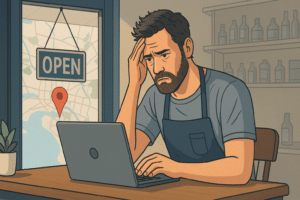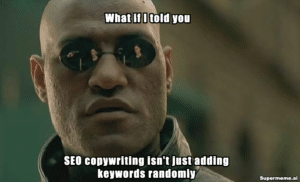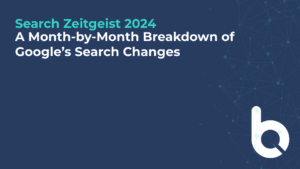How to appear at the top on Google. That’s the holy grail for any company with an online presence. There are dozens of aspects to consider when it comes to SEO for a local business in Australia. It’s a lot to digest for your average SME, let alone afford. By the same token, large corporations face the challenge of creating and executing complex strategies, either by hiring SEO experts or outsourcing.
Levelling the Playing Field with Local SEO
Local SEO is a powerful search engine optimisation avenue that’s often overlooked as businesses eye that coveted top spot. It’s a way of getting prominent placement on Google for your specific geographical location–without having to rank highly in the global rankings. Optimising your business for local SEO ensures that people in your state, city or even suburb can immediately see your business displayed in its own block as a recommended nearby destination.
One of the most common Google search terms is for business nearby e.g. “florists near me”. That’s exactly when local search engine optimisation is most effective. It highlights your business location and details for potential customers in your area who are looking for precisely what you offer. In sales parlance, these are virtually pre-qualified leads. And, since people use this kind of search so often, you can also expect an increase in sheer volume of potential customers visiting your website.
Local ranking tactics are especially useful for smaller or newly established businesses that are struggling to gain search engine visibility against more established competition and companies with bigger budgets. It levels the playing field at the coal face, so to speak, when people are searching for search engine recommendations with the direct intent of using or purchasing.
So let’s dig into SEO for local business, and how your company can benefit without breaking your budget.
Google Business Profile: A Comprehensive Guide
Google Business Profile (GBP) is one of the main foundations of local SEO. It was previously called Google My Business, so when we talk about GBP ranking factors, they’re the same as the GMB ranking factors you may come across in other articles.
GBP highlights your business in a dedicated block separated from the main search results, showing your location on a map. Here’s an example of a search for “smartphone repairs in Melbourne”:
This is the block where the Google Business Profile information is displayed, just below the top sponsored and organic search results. You’ll notice that Google has narrowed the location to the immediate area surrounding the place where we were when we did the search. The map displays the PIN locations, and the details of the businesses appear below that. This is also how to boost rankings in Google Maps. You can also click through to each one’s website, and get directions from your current location. If people click on “More businesses” they’ll see a page that looks like this:
This gives an expanded view, and also includes review snippets. When someone clicks on your business, they’ll get a rich content panel that can include photos and videos, as you see below:
These page views are the focus of SEO for local business. Google reports that 76% of smartphone users who find a business in their immediate location visit it within the next 24 hours. More importantly, an average of 28% of these searches resulted in a purchase. This alone clearly shows the importance of a local SEO profile, and how quickly it can produce tangible conversion results and additional revenue.
What makes the GBP so critical for local SEO services in Australia?
Your GBP content and the signals it sends to Google make up the number 1 local ranking factor. In other words, it’s the most important aspect of local SEO. This according to the Whitespark 2023 Local Ranking Factors report. It far outstrips other SEO signals – GBP signals make up 32% of the ranking factors. On-page signals are the next best at a far lower 19%. This underlines the weight that Google gives to GBP information.
Comprehensive GBP content also leads to higher click-through rates, as per a 2023 study by BrightLocal. According to this, companies with rich GBP content have a 70% higher click-through rate. Those with photos had a 35% higher click-through rate, and 42% more clicks on the “Directions” link.
Lastly, a GBP listing provides protection from the increasing phenomenon of “zero-click” searches. A zero-click search is when a search engine uses AI to retrieve content from a website and present it at the top of the search results. We’ve all seen this, and it has become a very contentious issue for businesses because it removes the need for the searcher to actually visit the website. There are accusations of Google cannibalising website content without rewarding the sites with click-throughs. This is a fair point, given that SparkToro had already found that in 2020 that around 65% of all Google searches were zero-click. This was based on substantive data provided by leading search engine analysis platform Similarweb.
However, you can overcome this problem by providing rich GBP content, thus forcing Google to feature your website regardless of the AI information it gives. It’s probably the best local SEO guide tip we can give you to help future-proof your website as AI comes barrelling towards us, for better or for worse.
Step-by-step guide to optimising your Google Business Profile for local SEO
- Step 1: List and verify your business on Google.
- Step 2: Add all the necessary information, like your address, contact details, opening hours and anything else you want to highlight.
- Step 3: Add multimedia content, like photos and video. These can almost double the amount of direction requests, and create around 35% more click-throughs, according to a SOCi analysis.
- Step 4: Collect as many reviews as you can. Engage your visitors and always respond to reviews.
- Step 5: Regularly share short content updates, promotions or other events to maintain a dynamic profile. Google monitors for this and rewards those who do so.
The Power of Google Reviews: Leveraging Customer Feedback

Reviews are another powerful local SEO tool. A Moz survey showed that the local SEO signals they send make up around 15% of the local SEO ranking factors. It’s one of the most accessible ways of boosting your website too. More than that, reviews help to build trust with potential customers. Good old-fashioned word of mouth remains one of the most effective marketing methods even in our tech-dominated age. Positive reviews also boost Google’s “trust” in your website, encouraging it to promote it in the SERPs. Consistently publishing new reviews will significantly help keep your website dynamic and relevant to Google.
Tips for successful SEO for local business using reviews
The proven recipe for successful customer reviews is to avoid generic praise and include the specifics of the customer’s experience. Ideally it should include a short description of the problem, how they communicated with your team and the results. It’s also useful to include names of your employees who completed the task. Photos can enhance the review too.
Encourage your customers to leave reviews as soon as they’ve made a purchase or use their services when the experience is still fresh in their minds. Make it as simple as you can for them to do this, by giving a direct link to your review section, for instance.
Responding to reviews is an important part of customer engagement. If the review is positive, thank the reviewer and leave a personalised message. If the review is negative, address the issue quickly and directly. You can turn an unhappy buyer into a loyal customer if you handle things the right way. Don’t be afraid to apologise, acknowledge the problem and provide a solution as quickly as possible.
Hopefully you’ll get lots of reviews, which means you’ll need some kind of review management process to help you respond to each one as necessary. You can use platforms like ReviewTrackers and BrightLocal for this.
With the integration of AI into search engine analysis and rankings, you need consistent, relevant reviews. These AI algorithms assess reviews for relevance, quality and individuality. They use keywords as part of the process, which means that you can create content around the reviews containing the most important ones to further enhance your appearance in AI-driven SERPs. It’s now an important part of how to do local SEO successfully.
Ensuring Consistency Across Platforms
With local SEO, it’s vital to make sure that your business details are identical across all key platforms, not only in your Google Business Profile. This could include TripAdvisor, Facebook, Bing Places or Instagram. The most important three details are known as NAP: name, address and phone number. Inconsistencies with these cause confusion with the search engines and compromise your rankings. Furthermore, AI-powered search tools require consistent data to present your information when people use these tools, like ChatGPT, Gemini or Perplexity.
Don’t use abbreviations on some platforms and not on others. This is one of the most common pitfalls that undermine your local SEO efforts. Another is neglecting to update all platforms when your details change.
It’s not difficult to set up an SEO checklist for local search inconsistencies to audit and correct your information across all platforms. Use that to ensure that your NAP details are all the same, that your information is correct on web directories, and that everything identically matches the information on your own website. Schedule this process regularly.
The Importance of Entity SEO in Local Search Results
Google and other search engines are constantly trying to determine the exact intentions behind user searches so that they can present evermore accurate results. In doing so, they attempt to understand the context and the relationships between entities. A simple example would be understanding the difference between a computer and a fruit when someone searches for something like “new apple types”.
Google accomplishes this by using Natural Language Programming (NLP) to create structured databases that contain “entities” and map the relationships between them. Using our very simple example, it will relate the “apple” entity with a “tree” entity in one case, and with a “laptop” entity in the other case. This is a very different method to the previous process of simply identifying keywords in the website content.
What does this mean for SEO for local business? It means that you must ensure that the content you publish clearly establishes your business as an entity related to all the other entities that are associated with your field. Google notes these associations, which helps it to better connect your business with the most relevant search terms, thus improving your SERP rankings. It also provides more targeted traffic, as your website is more likely to match the searcher’s intent. As a concrete example, if you sell paint, make sure that your content contains references to other “entities” like interior decorating, house renovation and the like.
Sharpening your entity SEO will benefit you by improving your website ranking in the SERPs through enhanced relevance and authority. This will increase incoming traffic that is more targeted and likely to be converted to customers. If your website has been optimised for entities, it will also help visitors find the information they want more easily.
How to implement entity SEO
Here’s a quick guide on how to apply entity SEO on your website:
- First identify the main entity or entities that you need to highlight. These will usually be your products or services.
- Research keywords to discover related entities.
- Create an information architecture – map out all your content pages and how they relate to each other.
- Optimise your on-page content around your entities, writing in clear and descriptive language.
- Provide schema markup in the form of specifically structured data at Schema.org.
With AI abilities now added to search engines, having clearly identified and structured entities is even more important, as these tools play a central role in contextual understanding. With everything neatly in place, your site will be well positioned to gain maximum visibility for your local SEO efforts.
Affordable Tools and Resources for Local SEO
Thankfully you don’t have to manually implement all these ways of boosting SEO for local business. We’ve already discussed how to do this with a Google Business Profile, and there are other tools you can use to ensure consistency and accuracy.
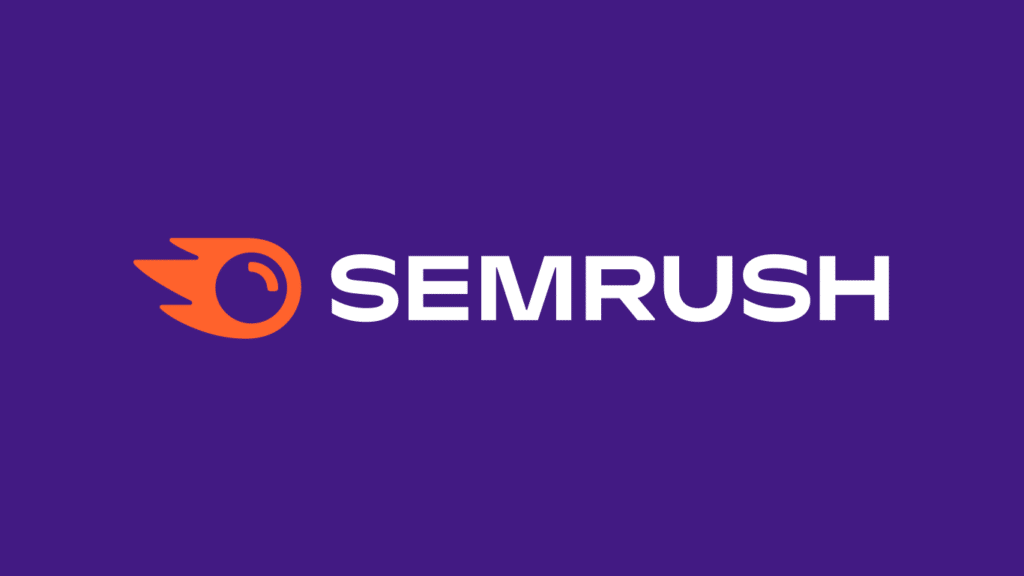
Semrush Local (free tier) – this lets you keep all your details consistent across various platforms from a central interface. It also allows you to respond to Google reviews from customers.
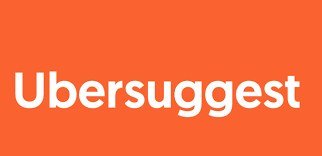
Ubersuggest – this gives you keyword search volumes and competitive analysis, and suggest how you can localise your content. It will also provide a list of long-tail keywords to attract more traffic. You can link it to Google’s Search Console to get insights on what search terms people in your area are using, and check how often your website appears in search results.

ChatGPT – of course you can use AI to get much of your local SEO done. It can identify the best keywords, suggest GBP improvements and help with content creation.

Perplexity is another useful resource for local SEO. It uses generative AI to create a more refined and accurate search experience. It can engage in active dialogue, allowing people to focus in on exactly what they’re looking for. You can use it in the same way as ChatGPT to refine your content.

Then there’s social media. These can be very efficient platforms for accessing highly targeted audiences in your neighbourhood. You can either use paid ads that allow you to refine your target market as tightly as you need, or build a community around your company page by posting engaging and useful content. This goes for all of them, from Facebook to Instagram. LinkedIn is particularly effective, as it provides a step-by-step process for completing your business profile, using specific search terms of your choice.
SEO for local business shouldn’t cost the earth
A local SEO strategy allows you to successfully compete with larger or more established businesses without spending much, if anything. The availability of free tools and the relative lack of resource commitment makes it a smart strategy. It provides excellent return on investment even if you do use some paid tools. This comes in the form of higher-quality, more qualified leads (visitors), which in turn leads to higher conversion rates. It also boosts brand awareness at a fraction of the cost of an ad campaign. Even if you outsource your local SEO work, you’ll soon break even and start generating more revenue.
Key Takeaways on Local SEO
Local SEO is an affordable way for your business to gain visibility on Google. The Google Business Profile is one of the cornerstones, allowing you to showcase your services or products with photos and videos, along with all your relevant company details to people in your immediate area. Because it’s so targeted, conversion rates are higher than average, making it even more effective.
Customer reviews are another essential element of successful SEO for local business. They create trust and are picked up by search engines for ranking purposes. Make sure to encourage your customers to leave a review, and make it as easy as possible for them to do it.
Entity SEO gives the search engines a different focus, which requires that you clearly establish what your products and services are, and how they relate to your industry as a whole. It helps Google to accurately index your website and show it to the right audience.
Finally, there are a number of mostly free tools you can use to make your local SEO easier. These, combined with higher conversions, can increase revenue and ensure fast ROI on a minimal budget.
Watch the Interview
Catch this insightful conversation with Matt Hodgson on How AI Is Changing SEO in 2025
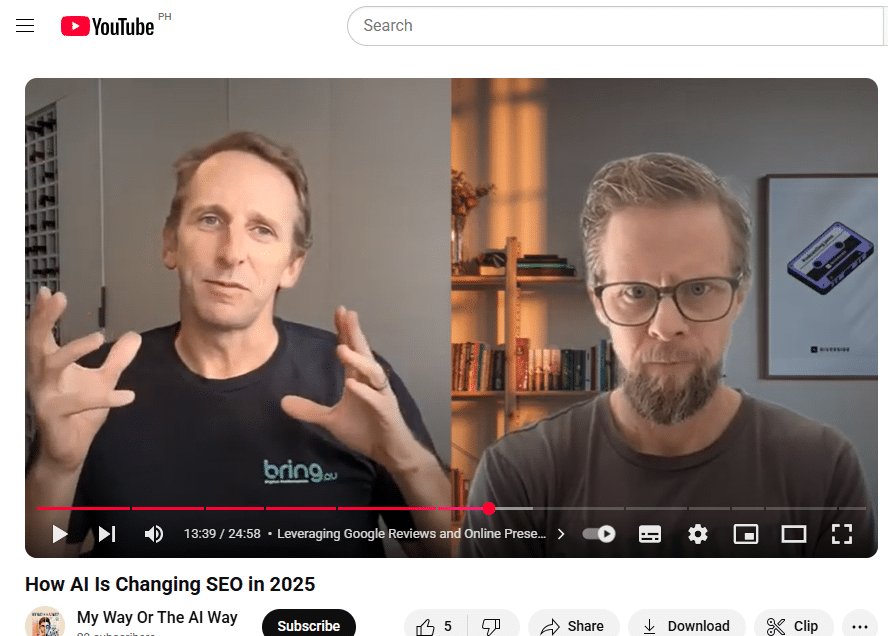
Frequently Asked Questions (FAQs) on Local SEO
How can I improve my local business’s visibility on Google Maps?
Improving your visibility on Google Maps primarily revolves around optimising your Google Business Profile (GBP). Here are quick steps you can follow:
- Ensure your business information (name, address, phone number, website, operating hours) is accurate and consistent.
- Regularly update your profile with new posts, photos, and promotions.
- Actively gather customer reviews and respond promptly and professionally.
- Use relevant keywords throughout your profile that match what your customers typically search for.
Research from SOCi suggests that adding multimedia content (photos and videos) can nearly double direction requests and boost click-through rates by about 35%.
What tools can help optimise my Google Business Profile?
Several effective tools can simplify and streamline the optimisation of your Google Business Profile:
- Semrush Local (free tier): Helps manage and ensure your business details remain consistent across platforms.
- BrightLocal: Offers comprehensive management of customer reviews and citation building.
- ReviewTrackers: Specialises in monitoring and responding to customer reviews effectively.
- ChatGPT or Perplexity: Useful for generating keyword suggestions, content ideas, and refining your overall profile content.
What are the best tools for managing local SEO and improving local search rankings?
Effective tools to manage local SEO and improve your local search rankings include:
- Semrush Local: Manages your local listings and tracks your SEO performance.
- Ubersuggest: Provides insights on keyword search volumes, competitive analysis, and suggests localised content strategies.
- Moz Local: Assists with citation building, consistency checks, and SEO performance metrics.
- BrightLocal: Known for citation tracking, review management, and detailed reporting on local SEO performance.
Can you recommend a platform that offers citation building and local SEO services?
Yes, BrightLocal and Moz Local are both reputable platforms that offer comprehensive citation building and local SEO services. These platforms ensure your business information remains consistent across multiple directories, enhancing your local visibility and search rankings.
What services can help small businesses optimise their online presence and attract more local customers?
Small businesses can significantly enhance their online presence and attract more local customers by utilising these services:
- Google Business Profile (GBP): Fundamental and free tool for local visibility.
- Citation Management Services (Moz Local, BrightLocal): Ensure consistent and accurate business details across online directories.
- Review Management Platforms (ReviewTrackers, BrightLocal): Facilitate the acquisition and management of customer reviews.
- SEO Keyword Tools (Semrush, Ubersuggest): Help identify local keyword opportunities and competitive analysis to boost visibility.
Using these services strategically can greatly amplify your online presence, increase customer engagement, and ultimately drive local traffic and conversions.
How long does it typically take to see results from local SEO efforts?
Typically, you can start noticing improvements within a few weeks to a few months. However, achieving significant and consistent results usually takes around 3-6 months, depending on competition and how effectively your strategies are implemented.
What are common mistakes businesses make with local SEO?
Common mistakes include inconsistent business information (NAP), neglecting reviews, failing to regularly update Google Business Profile, and not leveraging local keywords effectively.
Why is consistency in business listings (NAP) so crucial for local SEO?
Consistency in your business name, address, and phone number (NAP) across all platforms helps search engines trust your business data, leading to improved local search rankings and better visibility.
How important is mobile optimisation for local SEO?
Mobile optimisation is extremely important since most local searches are conducted via smartphones. Ensuring your website loads quickly and is easy to navigate on mobile can significantly boost local visibility and conversions.
What is entity SEO, and why does it matter for local businesses?
Entity SEO involves clearly defining your business and its related products or services across the web. This helps search engines better understand your business context, enhancing relevance in local search results and improving your overall visibility.
How can social media impact local SEO rankings?
Social media can positively impact local SEO by increasing brand visibility, driving local traffic to your site, and generating social proof through customer interactions and reviews. Active social profiles send positive signals to search engines about your business’s credibility and relevance.
Does having a blog or regularly updated content help local SEO?
Absolutely. Regularly updated content, like blogs, can significantly boost your local SEO by targeting relevant local keywords, showcasing your expertise, and consistently providing fresh content that keeps visitors engaged and returning.
What’s the role of backlinks in local SEO?
Backlinks from reputable, locally-relevant websites significantly boost your business’s authority and visibility in local search results. They act as endorsements that enhance your credibility and improve rankings.
How often should I update my Google Business Profile?
Ideally, you should update your Google Business Profile regularly—at least once a week. Frequent updates show Google and your audience that your business is active and engaged. Updates can include new posts, fresh images, promotions, or event announcements. Regular activity helps improve visibility and signals reliability to potential customers.
Can negative reviews hurt my local SEO rankings?
While negative reviews aren’t ideal, they’re not necessarily harmful if managed properly. Responding professionally and promptly to negative feedback can demonstrate your commitment to customer satisfaction and potentially turn a negative into a positive. Google views active engagement and transparent management of reviews as positive signals, often outweighing the impact of occasional negative feedback.



